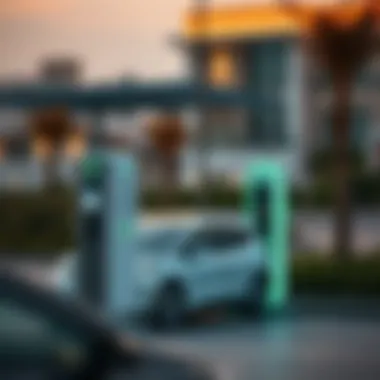Electric Vehicle Charging Stations in the UAE: Trends and Future


Intro
The surge of electric vehicles (EVs) across the globe has prompted a significant shift in the transport ecosystem of the United Arab Emirates (UAE). With a governmental push for sustainable energy and an eye toward a greener tomorrow, the nation is rapidly expanding its infrastructure for EV charging stations. This article aims to explore the current landscape of EV charging stations in the UAE. It goes beyond just the facts, diving into the implications for investors, developers, and even homeowners, as the rising tide of electric mobility begins to redefine the property and transport markets.
As the UAE positions itself as a regional hub for innovation and sustainability, the increasing adoption of EVs reflects changing preferences and highlighted ambitions for a more eco-friendly lifestyle. The implications of this transition are broad, impacting not just the energy sector but also the essential real estate market. In the coming sections, we will analyze market insights, investment strategies, and assess what the future holds for EV charging infrastructure within this thriving economic landscape.
Market Insights
Understanding the current market dynamics is crucial for anyone involved in real estate or investment in the UAE. The rise of EVs is not just a trend — it's a significant shift impacting property values, urban planning, and overall demand for various kinds of real estate. Let's break it down into two core areas: current property trends and pricing analysis.
Current Property Trends
As more people opt for electric vehicles, the demand for properties equipped with charging stations grows. In fact, buyers are beginning to factor the availability of EV infrastructure into their property choices. Particularly in urban areas such as Dubai and Abu Dhabi, residences with charging capabilities are becoming hot commodities. Reasons include:
- Minimized emissions, appealing to eco-conscious buyers.
- Convenience for residents who own electric cars.
- Increased property values due to the modern amenities offered.
Developers are catching on. New apartments, villas, and commercial properties are now being built with dedicated EV charging stations, which isn't just good for the environment — it’s also a savvy marketing strategy. As such, this trend is reshaping the real estate landscape, compelling developers to rethink their designs and offerings to meet buyer expectations.
Pricing Analysis
When it comes to pricing, properties with EV charging stations usually hold a premium. It's an ongoing trend that can be attributed to the scarcity of such amenities. As more buyers demand these features, prices rise, potentially exceeding those of similar properties without charging capabilities. Initial investments in charging infrastructure are tangible. However, the long-term benefits can outweigh the upfront costs:
- Increased attractiveness to renters or buyers.
- Long-term energy savings for residents.
- Alignment with government initiatives promoting sustainable living.
The exciting part of this transition is the potential for future growth. As EV adoption rates skyrocket and charging stations become ubiquitous, today's premium pricing may establish a new baseline for future property values.
"As electric vehicle adoption rises, properties featuring EV charging infrastructure are likely to see increased demand and value — a fundamental shift in the real estate landscape."
As we delve further into the following sections of this article, we will examine strategies for investors looking to tap into this budding market. By laying out practical tips and contrasting long-term versus short-term investments, our goal is to equip stakeholders with essential insights for navigating this dynamic sector.
Intro to EV Charging Stations
As the global conversation shifts towards sustainable energy solutions, the introduction of electric vehicles (EVs) has gained significant momentum, especially in the UAE. This shift is not merely a trend; it's a transformative movement that's reshaping the very fabric of our transportation infrastructure. So, when we talk about EV charging stations, we’re not just discussing kiosks and plugs; we’re diving into the lifeline of electric mobility.
Understanding Electric Vehicles
Electric vehicles are no longer the future; they are the present. With innovations being made every day, these vehicles run on electric power, offering cleaner alternatives to traditional gasoline engines. A diverse range of models is available, from compact cars to luxury SUVs, showcasing increasing accessibility for varied consumer choices. However, EVs are only as good as the infrastructure that supports them. For example, imagine owning a high-end Tesla but without a reliable way to charge it. An impressive car without ample charging options is like having a smartphone without a charger—frustrating and limiting.
Importance of Charging Infrastructure
Charging infrastructure serves as the backbone of the electric vehicle ecosystem. It is vital for promoting EV adoption across the board. Without robust and widespread charging stations, the convenience factor dips, leading to what is often termed as 'range anxiety.'
“Range anxiety is a psychological barrier that arises when electric vehicle owners worry about running out of battery power before they can reach a charging station.”
This concern has been addressed head-on in the UAE, where the government and private sectors are colluding to create a web of charging networks. This concerted effort not only boosts consumer confidence but also enhances the EV market's attractiveness for potential investors and homeowners alike.
- Increased Accessibility: Just like gas stations shaped road trip culture, charging stations can do the same for electric vehicles.
- Economic Considerations: The rise in charging infrastructure can lead to an increase in property values, as homes with easy access to charging stations become more appealing.
- Sustainability Goals: By investing in a rich network of charging stations, the UAE aligns with its long-term sustainability goals, reducing carbon footprints while paving the way for a greener future.


In this article, we will explore the current state of EV charging stations, delve into market trends, and look ahead to the future landscape of electric mobility in the UAE, illustrating how this critical infrastructure is shaping opportunities in the real estate market alongside its influence on transportation.
Current State of EV Charging Stations in the UAE
The current landscape of electric vehicle (EV) charging stations in the UAE reflects a burgeoning commitment to sustainable transport solutions. As the world leans towards eco-friendly modes of propulsion, the UAE is ensuring it keeps pace by developing a robust EV charging infrastructure. The topic is particularly relevant as it illustrates how the nation is not only addressing its carbon footprint but also embracing a new wave of mobility that could reshape urban planning and real estate dynamics.
Overview of Existing Infrastructure
As of now, the UAE boasts a network of charging stations that is expanding rapidly. Major cities like Dubai and Abu Dhabi have made significant strides, with charging stations strategically placed at shopping malls, public parking spaces, and along highways. The UAE Government has partnered with various stakeholders to set up numerous fast charging stations.
Additionally, the deployment of these stations is not just for show. The intent is clear – make EV charging as convenient as refueling petrol vehicles. Currently, the UAE has installed more than 300 charging points, with initiatives to double that in the coming years.
The following attributes define the charging infrastructure:
- Accessibility: Stations are made available in urban and suburban locations, increasing convenience for drivers.
- Diversity of Options: AC and DC charging options cater to varying consumer needs.
- User-Friendly Technology: Most charging stations utilize a contactless payment system that helps streamline the user experience.
Major Players in the Market
Government Initiatives
The UAE government plays a crucial role in laying the groundwork for EV infrastructure. Policies aimed at promoting electric vehicles have become more prevalent. One key initiative is the "Green Vehicles" program, which offers incentives for EV owners, such as waiving registration fees or offering free parking.
Such government backing cultivates trust and promotes widespread adoption. What makes these initiatives particularly effective is the collaboration with both public and private sectors to support infrastructure. This collective effort not only aids in the establishment of charging stations but also fosters a cultural shift towards sustainability. However, there are challenges, such as bureaucratic red tape that can slow down implementation.
Private Sector Involvement
Private enterprises are also stepping into the fray, enhancing the EV charging ecosystem. Leading players like EDF Energy and Dubai Electricity and Water Authority (DEWA) have commenced initiatives to complement government efforts. These companies focus on expanding the charging network while introducing innovative technologies.
The main selling point of private sector participation is agility. Unlike government entities, private companies can respond more swiftly to market demands. Their investment often leads to improvements in technology and customer service. Moreover, partnerships between private firms and the government can reduce costs and expedite the rollout of charging stations. Of course, with this push can come the risk of inconsistencies in service areas and pricing.
"The pace at which the UAE is developing its EV charging infrastructure can be seen as a barometer for the region's intent to shift towards sustainable living."
In summary, the current state of EV charging stations in the UAE reveals a landscape ripe with opportunity. Government initiatives coupled with private sector involvement exhibit a comprehensive approach to establishing a sustainable transport system. As this infrastructure continues to evolve, both the challenges and advantages will play a pivotal role in the UAE’s journey toward becoming a global leader in electric mobility.
Trends Driving EV Adoption
Electric vehicles (EVs) are increasingly becoming mainstream in the UAE, driven by several significant trends. This section serves to elaborate on these dynamics, specifically looking at the effects of government policies, shifting consumer preferences, and the advent of innovative technologies. Understanding these trends is essential for investors, real estate developers, and homeowners who are keen to navigate this evolving landscape effectively.
Government Policies and Incentives
The UAE government has been a formidable force in the acceleration of EV adoption through strategic policies and compelling incentives. Initiatives like the Dubai Clean Energy Strategy and the Abu Dhabi Vision 2030 lay out ambitious goals for sustainability, directly promoting the use of electric vehicles. For instance, the government offers rebates for EV purchases, reduces registration fees, and provides tax breaks, all aimed at making electric vehicles more appealing to consumers.
Such measures not only encourage individual ownership but also communicate to developers and investors that the market for EV infrastructure is burgeoning. With policies supportive of green technologies, stakeholders are motivated to invest in EV charging stations, thus facilitating wider access.
Furthermore, collaborations with private entities, like the partnership with DEWA (Dubai Electricity and Water Authority), to install charging stations across the city, help in creating a robust charging network. These government initiatives are paving the way for an electrifying future where EVs are not just an option but a norm.
Changing Consumer Preferences


As the market shifts, so do consumer preferences. Today's buyers are no longer just looking for cars; they are opting for environmentally friendly alternatives that reflect their values. The rising awareness regarding climate change and the urgency to cut down on fossil fuel usage has shifted the mindset.
Additionally, UAE residents are increasingly valuing the long-term savings associated with EV ownership, such as reduced fuel and maintenance costs. Many people find themselves gravitating towards the like of the Tesla Model 3 or the Nissan Leaf not just for their appeal but because they align with their personal and social beliefs about sustainability.
Moreover, as charging infrastructure expands and becomes more accessible, barriers to entry diminish. For instance, locations such as malls and office complexes now feature charging stations, minimizing concerns over range anxiety, thus persuading more consumers to consider EVs as viable choices for their daily needs.
Technological Advancements
Cutting-edge technologies are revolutionizing the electric vehicle landscape at a pace that’s hard to ignore. Innovations like fast charging capabilities and improved battery technologies are reshaping the EV experience. Charging stations equipped with rapid chargers can now revive a vehicle’s battery in as little as thirty minutes, catering to the on-the-go lifestyle many in the UAE lead.
In addition, smart technologies such as mobile apps empower users to locate the nearest charging station effortlessly, check real-time availability, and even manage charging schedules at home.
Importantly, the concept of "vehicle-to-grid" technology is emerging, enabling EVs to function not only as vehicles but as mobile energy storage units for homes or offices. This trend signifies an integrated approach to energy generation and consumption, offering additional benefits to EV owners.
As technology continues to evolve, investors and real estate developers would be wise to focus on smart and sustainable charging solutions that address current market needs while preparing for future demands.
"The convergence of government action, consumer demand, and technological progress sets the stage for a transformative era in mobility, where electric vehicles play a central role."
These trends present ample opportunities across various sectors, particularly in real estate, where the integration of EV infrastructure can enhance property values and appeal.
Impact on Real Estate Market
The intersection of electric vehicle (EV) charging infrastructure and the real estate market in the UAE is significant. As EV adoption increases, the demand for charging stations at residential and commercial properties is likely to follow suit. Real estate professionals need to recognize the potential benefits that EV charging stations can provide to both property value and attractiveness. The integration of these stations represents not just an upgrade in technology but a change in lifestyle, reflecting a shift toward sustainability and innovation.
EV Charging Stations as a Selling Point
Having EV charging stations on a property can make it stand out in a crowded market. For many potential buyers, especially environmentally conscious consumers, the availability of charging facilities may be a deal maker or breaker. Properties equipped with these amenities can leverage this feature in marketing strategies to draw attention.
- Market Differentiation: In neighborhoods saturated with similar housing options, having an EV charging point can distinguish a property. This can be particularly effective in areas where EV use is growing.
- Appeal to Eco-Friendly Buyers: As more people prioritize sustainable living, homes that accommodate electric vehicles will attract environmentally responsible buyers.
- Proximity to Major Routes: Locations that provide convenient access to charging stations near commercial hubs or highways can enhance the desirability of the property.
Potential buyers often look for properties that suit their modern lifestyles. Electric vehicle ownership reflects a progressive attitude, and a property that supports this lifestyle through accessible charging can become more appealing on the market.
Influence on Property Values
The presence of EV charging stations can notably increase the long-term value of a property. Similar to other amenities such as swimming pools and fitness centers, charging stations can enhance a property's overall worth. There's a growing recognition that properties with EV facilities are more likely to retain or appreciate in value over time.
- Rising Demand: As the UAE government promotes electric vehicles, properties aligned with this demand are likely to see value increases.
- Investment Opportunities: Investors may find properties with charging infrastructure particularly appealing, as they can cater to a growing segment of the market while potentially enjoying higher returns.
- Commercial Properties: Businesses that invest in EV charging can attract more customers, as many shoppers prefer to frequent establishments that support their lifestyle. Retailers may experience a distinct competitive advantage.
In essence, the addition of EV charging stations translates to increased property attractiveness and value. Owners could see a solid return on investment as the EV landscape continues to evolve.
Integrating EV Infrastructure in New Developments
The future of real estate in the UAE will increasingly involve integrating EV charging stations into new developments from the ground up. Forward-thinking builders must consider this as a standard feature rather than an afterthought. Developers can strategically plan for EV infrastructure to better meet future requirements and elevate their projects.
- Design Flexibility: By incorporating EV charging stations during the planning and design process, developers can ensure the best use of space and resources, which ultimately enhances the overall functionality of the property.
- Grant Opportunities: There may be incentives or grants available for developers who choose to integrate EV networks into their projects, which can offset initial costs.
- Sustainable Development Goals: Embedding EV infrastructure aligns with sustainable development goals and meets the expectations of modern buyers who value eco-friendliness.
A proactive approach to integrating this infrastructure will inevitably lead to a smoother transition into an electric future, benefiting both developers and homeowners alike. Recognizing how critical EV charging stations are to modern real estate can propel new developments into one of the key trends in the UAE's property market.


The growing demand for EVs and their charging stations is not just a trend; it's becoming a fundamental part of the urban landscape.
Future Outlook for EV Charging Stations
The future outlook for electric vehicle (EV) charging stations is a pivotal topic due to the ongoing transition toward sustainable transport solutions. As the UAE pushes forward with its ambitious vision for clean mobility, analyzing the landscape of EV charging becomes crucial for various stakeholders, including investors, developers, and homeowners. The expected growth in EV adoption and infrastructure development is not just a trend; it represents a significant shift in how transportation and urban planning are approached.
The integration of charging stations into everyday life will undoubtedly enhance the convenience of owning an electric vehicle. Furthermore, these stations could provide ample opportunities for investment, especially in areas undergoing rapid urban development.
Projected Growth of EV Market in the UAE
The demand for electric vehicles in the UAE has been on an upward trajectory, bolstered by government initiatives and changing consumer preferences. According to the latest reports, the EV market is forecasted to expand exponentially over the next decade. Not only is the government promoting policies to encourage EV use, but manufacturers are also ramping up production to meet this anticipated demand.
Several factors contribute to this bullish outlook:
- Regulatory Support: The UAE government is committed to achieving sustainability goals, which encompasses extensive support for electric vehicles.
- Rising Fuel Prices: The ongoing fluctuation in fuel prices has made electric vehicles a more financially appealing alternative for everyday consumers.
- Technological Progress: Advancements in battery technology have led to increased range and efficiency for electric vehicles, making them more viable.
Challenges Facing Expansion of Charging Networks
While the potential for growth is palpable, several challenges could stall the expansion of charging infrastructure in the UAE.
Regulatory Hurdles
Regulatory hurdles are among the most prominent issues impacting the expansion of EV charging networks. The varying regulations across different emirates create inconsistencies that complicate the planning and installation processes for charging stations. For instance, some localities may require lengthy permitting processes, which can significantly delay project timelines.
Additionally, there's a lack of standardized regulations regarding operational timings and maintenance, which can affect the reliability of charging stations. This inconsistency is a hurdle worth grappling with, as it not only impacts investors but could potentially deter consumers from embracing EV technology fully.
Funding and Investment Issues
Funding and investment issues are equally critical factors influencing the growth of charging stations. Many startups and emerging companies face challenges securing adequate financing to establish charging networks. Investors might hesitate due to uncertainties about the return on investments in what is still perceived as a niche market.
Moreover, the high costs of installation and maintenance could discourage further investment from private entities. However, this situation could present opportunities, as savvy investors might navigate this challenge by collaborating with government entities and established players. Such collaborations can foster a more robust investment climate, enabling a broader rollout of charging infrastructure in the long run.
Role of Smart Technologies
In the realm of EV charging stations, smart technologies are set to play a crucial role in transforming the user experience. Innovations such as apps that allow users to locate nearby charging stations in real-time and services that adjust pricing based on demand are becoming essential features.
Moreover, the integration of renewable energy sources with charging stations could further enhance sustainability efforts. Smart grid technology can optimize energy distribution, allowing charging stations to harness solar or wind power, thus complementing the UAE's vision for green energy.
Ultimately, the future for EV charging stations in the UAE is both promising and fraught with challenges. Addressing the hurdles mentioned will require collaboration among various stakeholders, but the potential rewards could vastly outweigh the risks.
End
As we reflect on the intricate network of electric vehicle charging stations in the UAE, it's vital to underscore the pivotal role this ecosystem plays for various stakeholders. This is not just about fostering a greener future; it’s about creating a practical framework that supports the growth of the electric vehicle market and intertwines seamlessly with real estate development.
Summary of Main Points
The exploration of EV charging stations has uncovered several key aspects:
- Current Infrastructure: The UAE boasts a well-established framework of charging stations, provided by both government initiatives and private sector players, which is crucial for driving EV adoption.
- Trends Influencing Adoption: Various factors such as government policies, changing consumer behavior, and technological advancements are paving the way for a more electrified transportation landscape.
- Impact on Real Estate: Integrating EV charging facilities into property development enhances attractiveness and potentially boosts market value, aligning with sustainability goals.
- Future Outlook: While the EV market is experiencing robust growth, challenges such as regulatory hurdles and investment necessities must be addressed to ensure sustainable expansion of charging networks.
Final Thoughts on EV Charging in Real Estate
With each new charging station, the UAE is not merely building a network; it’s constructing the very foundation of a sustainable future.
For further insights, explore additional resources on this evolving topic at Wikipedia.











